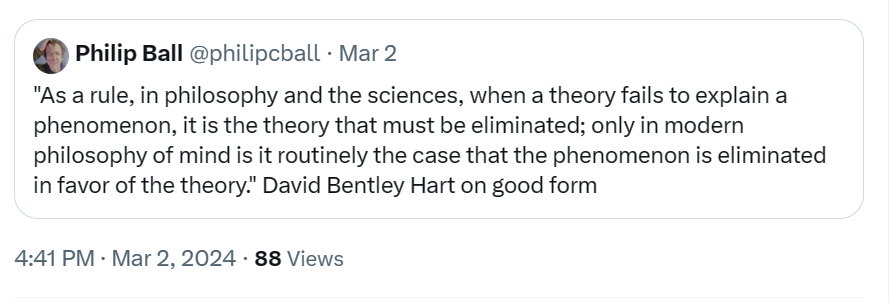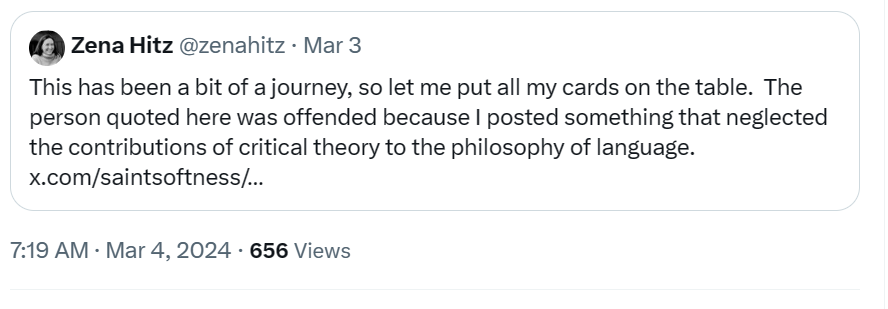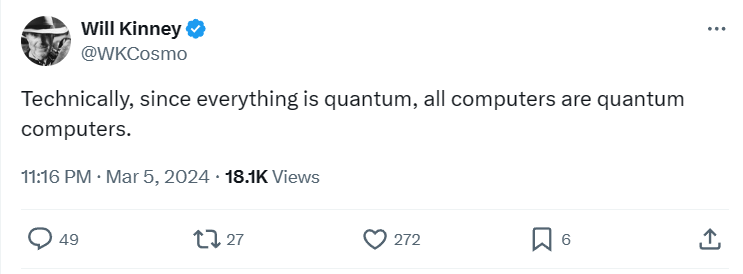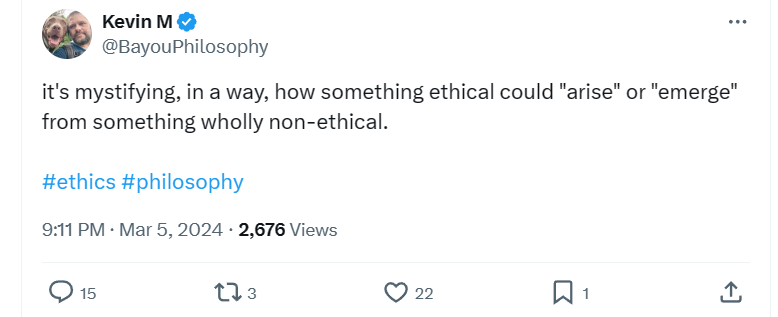Does Theory Rule OK in the Philosophy of Mind?

There may be some truth to what David Bentley Hart says about what he calls “modern philosophy of mind”. However, it entirely depends on examples and specifics. In this quote at least , there aren’t any.
Philosophers of mind have actually adopted almost every position under the sun on the nature of the mind. (Perhaps this is what Hart meant.) Also, I can only assume that David Bentley Hart is actually referring to consciousness, which is eliminated by a very-small number of philosophers of mind. And even in these cases, it often simply amounts to them eliminating certain faulty conceptions of consciousness, not eliminating consciousness itself.
Theory may well rule okay when it comes to some philosophers. However, theory also rules okay when it comes to some physicists, biologists, etc. Of course, these scientists also rely on data, experiment, observation, etc. (After all, they’re scientists!) But many modern and contemporary philosophers have also taken note of data, experiment, observation, etc.
Again, I believe that David Bentley Hart is actually talking about philosophers’ positions on consciousness. (Perhaps he isn’t.) I’d need to see how he’s tackled the specific arguments and words of specific philosophers of mind.
[After posting this, I Googled the name David Bentley Hart and found out that he’s a theologian and a religious expert on… religion.]
“Everything is Mathematical.”
So what!

“The age old question still haunts me : is cognition inherently mathematical or mathematical intuitions are just a modelling tool?”
— Bodhi
Almost everything (even a quale) is mathematical in a banal sense. That is, almost everything can be described using numbers. Alternatively, almost everything can be assigned a number.
This idea was once captured when the American philosopher John Searle once wrote that an open window can be assigned the number 1, and a closed window can be assigned the number 0. Thus, we have a basic computer.
Also, if I throw a deck of cards across the floor, that mess-of-cards can still be described mathematically or with numbers. Indeed, even unintended patterns will be found. All this may serve little purpose, but it can still be done.
That said, in many cases the maths is extremely helpful. Still, the use of maths or numbers can also be gratuitous — just used for the hell of it or to give the work kudos.
[Check out my ‘Donald Hoffman Is Lost in Maths: Decorated Permutations, Markov Chains… and Idealism’.]
The Essays I Should Have Written

After having a fair few essays published here and there, I’ve stopped being surprised by the amount of people who say that, in response to a particular essay, I’ve “neglected” this person or that idea, or that I’ve “missed the point”. (They also state: “Why didn’t you mention…?”) Nearly all these responses amount to asking (or implying) the following:
Why didn’t you write the essay I believe you should have written?
Fair enough, and in response:
So you should write the essay you believe that I should have written. Are you up to that job?
Which Philosophers Must We Read?

There may be some validity to being outraged by the fact that
“you can get Ph.D. in the United States without reading Emerson, Dewey, James, MLK and Peirce”.
The problem here is that many philosophers and students say something very similar. It’s just that they use different names. They say:
I can’t believe that you can get a philosophy Ph.D. in [] without reading [].”
This is very much like the “Philosophy is…” mantra.
Aren’t philosophers, students of philosophy and others conflating their own personal interests and backgrounds, their own personal views, what they’ve personally read, etc. with what philosophy is… And, in this case, with what must be read?
In terms of actual data. I wonder how many French students have read Descartes (in detail), and how many English students have read Hume (in detail).
I remember a few people telling me that many French lorry drivers have read Descartes. And that nearly all French people read philosophy. I deemed these claims to be Romantic (positive) stereotypes.
I Feel Free!

I doubt that a single “decisive reason” — either way — would convince most people. That’s because they’ve the strong psychological (or phenomenological) experience of what they deem to be their own free will.
This experience of (what is taken to be?) free will (or even the feeling of one’s own free will) largely occurs regardless of reasons, arguments and data.
Of course, what seems to be the case and what is the case don’t always coincide.
Apart from all that, this debate largely hinges on what the various disputants mean by the words “free will”. Thus, there’s a lot of talking passed each other in this ancient debate.
Shorter

So the human brain is a “quantum brain”. (This is a phrase which has actually been used many times.) There are also quantum cups, quantum trees, quantum genitals, quantum books on “quantum weirdness”, etc. etc. etc.
Of course, an object being constructed and run by human beings according to quantum logic and principles, is very different to inanimate and animate objects being simply… quantum (i.e., regardless of human beings).
Is the Ethical Mystifying?

Why is it “mystifying”? Mystifying to Kevin M? Or mystifying to literally everyone? Very many people have explained ethics. (Or at least they’ve explained “something ethical”.)
They may not have offered the absolute truth on the matter. However, if we have a multitude of both good and bad explanations, then why does the mystery remain? Indeed, even a bad explanation is still an attempt to lesson the (supposed) mystery…
That’s unless people want ethics to remain a mystery for eternity.
I believe that this is the position of at least some philosophers and many laypersons when it comes to consciousness, free will, etc. In other words, x’s being a mystery, for such people, is very important. To them, the mystery is an essential part of x.











No comments:
Post a Comment